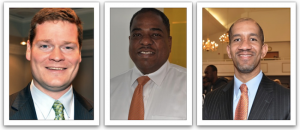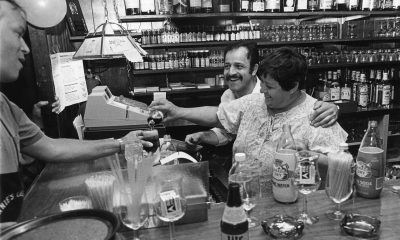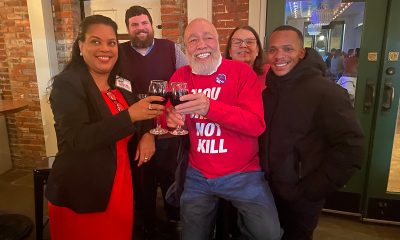Local
Council candidates compete for LGBT vote
Wooing crowds at Town, Nellie’s and Ziegfeld’s as low turnout expected next week
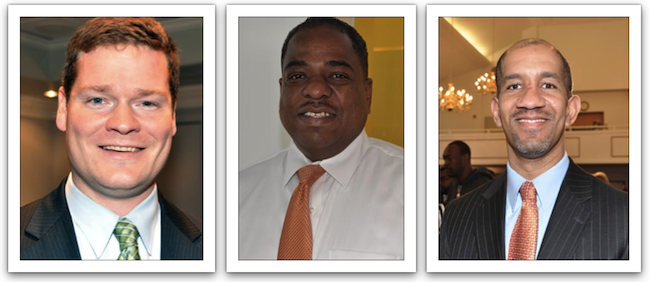
At least four of the nine candidates running in the April 26 special election for an at-large D.C. City Council seat are aggressively courting LGBT voters in a race that political observers say is highly unpredictable.
With special elections known for yielding a low voter turnout, LGBT voters could be the deciding force in the election if they coalesce behind one candidate, according to activists following the race.
Many of the city’s LGBT activists are supporting Democrat Sekou Biddle, a former Ward 4 school board member who won an interim appointment to the at-large Council seat in January. Biddle has expressed strong support for LGBT rights.
But Democrat Vincent Orange, a former Ward 5 Council member, and Republican Patrick Mara, a Ward 1 school board member, have surprised some LGBT activists by recruiting prominent LGBT supporters and by waging active campaigns targeting the LGBT community.
In the Ward 8 race for a vacant seat on the city’s Board of Education, veteran gay Democratic and Ward 8 civic activist Phil Pannell is leading a field of nine candidates in money raised and spent, according to a campaign finance report he filed on April 18, the last report to be filed before the April 26 election.
Pannell has been an outspoken advocate for LGBT rights, including same-sex marriage, in a ward where the majority black population is known to be more conservative on social issues. The Ward 8 Council member, former D.C. Mayor Marion Barry, was one of just two of the city’s 13 Council members who voted against the same-sex marriage bill that the Council approved in December 2009.
“I’m running on a platform that supports the very best in public education for all of our youth, including LGBT youth,” Pannell said last month after receiving the endorsement of the Gertrude Stein Democratic Club, the city’s largest LGBT political organization.
He is the only gay candidate running in the April 26 election, which was called to fill two school board seats – one in Ward 8 and another in Ward 4 – in addition to the at-large Council seat.
His campaign finance report shows he has raised $21,307 as of April 18, with $17,225 coming from a personal loan he made to his campaign. The report shows Pannell spent $10,672 on campaign-related activities as of April 18.
Pannell’s closet rival in the money department is LGBT supportive D.C. home rule advocate Eugene Dewitt Kinlow, who raised $11,133 and spent $3,000 as of April 18. Pannell had $9,471 in cash on hand for the remaining week of the campaign, his finance report shows, compared to Kinlow, who had $7,633 in cash on hand.
The at-large Council seat became vacant after Democrat Kwame Brown, who held the seat, won election last year as D.C. Council Chair. The city’s Democratic State Committee appointed Biddle to fill the seat on an interim basis in January until a “permanent” Council member was chosen in the April special election.
Since the at-large Council seat held by Brown was scheduled to come up for election in 2012, the winner of the special election on April 26 must also stand for re-election in 2012.
Orange has raised more than $261,000 in campaign funds as of April 18, the last required campaign finance reporting period before the election. Biddle’s April 18 finance report shows he has raised just over $175,000 for his campaign, putting him in second place in money raised. Mara’s report shows him in third place in the money department, with $60,559 raised.
Many of the city’s political pundits believe Orange and Biddle are the frontrunners in the race, with Orange having the advantage in funds raised as well as an endorsement by the city’s influential municipal employees union. Biddle has been endorsed by Mayor Vincent Gray, City Council Chair Kwame Brown, and several other Council members, including gay Council member David Catania (I-At-Large).
Mara received the endorsement of the Washington Post, which billed him as a needed independent voice in a city government dominated by Democrats. The Post backing is expected to give his campaign a boost in Wards 2, 3 and 6, where voter turnout is often higher than in the other wards.
Orange came out against same-sex marriage when he ran unsuccessfully for mayor in 2006. Earlier this year, he announced he had changed his position on the issue and now fully supports the right of gays and lesbians to marry under the city’s same-sex marriage law. He also pointed to what he called his long record of support on other LGBT issues during his tenure as a Ward 5 Council member.
Mara emerged as an early supporter of same-sex marriage when he ran unsuccessfully for a City Council seat in 2008. He has billed himself as a “fiscally responsible and socially progressive” Republican who strongly supports LGBT equality. He notes in his campaign literature that he was the only one of the nine candidates now running for the at-large seat who testified in favor of same-sex marriage when the same-sex marriage bill came up for a hearing before the City Council in 2009.
Biddle has said he spoke out in support of the same-sex marriage law when it was pending before the Council. He notes that he was an advocate for LGBT youth related issues during his tenure as a school board member.
Ward 1 Advisory Neighborhood Commissioner Bryan Weaver, a Democrat, has also spoken out in support of LGBT issues at candidate forums across the city. He, too, spoke out in support of the same-sex marriage law and backed an ANC resolution endorsing the proposed law as it was pending before the Council.
Biddle’s gay supporters, including leaders of the Gertrude Stein Democratic Club, the city’s largest LGBT political group that has endorsed Biddle, say they believe Biddle will capture the lion’s share of the LGBT vote. They acknowledge, though, that other candidates are challenging Biddle for the gay vote and could capture some of that vote.
Rick Rosendall, vice president of the Gay and Lesbian Activists Alliance, said that similar to nearly all D.C. elections since the early1980s, virtually all candidates running for public office in the District express support for LGBT equality. According to Rosendall, D.C.’s LGBT community – unlike other cities and states – has the luxury of setting a higher standard for selecting candidates based on their knowledge, understanding and sophistication on specific LGBT and AIDS-related issues.
“It’s not a matter of just saying I support you,” he said. “It’s a matter of demonstrating an understanding of the issues and showing what they will do to address them.”
GLAA, a nonpartisan organization, has rated candidates on LGBT and AIDS-related issues, along with some broader issues, since the group was founded in 1971. Based on candidate responses to a questionnaire and their record on LGBT-related issues, the group assigns them a score ranging from +10, the highest possible rating, and -10, the lowest rating.
In the at-large Council race set to be decided on April 26, GLAA gave Biddle and Weaver a +5.5, the highest rating among the nine candidates in the race.
Mara and Statehood Green Party candidate Alan Page received a +4. Orange received a +3.5 and Joshua Lopez, a Ward 1 Democrat and aide to former Mayor Adrian Fenty, received a +2.5.
Each of the candidates expressed support for all of the LGBT issues and positions raised by GLAA on the group’s questionnaire, including strong support for the city law that legalized same-sex marriage.
The remaining three candidates in the at-large race – Democrats Tom Brown and Dorothy Douglas and independent Arkan Haile – did not return the GLAA questionnaire and had no record on LGBT issues known to GLAA, prompting the group to give the three a “0” rating.
In addition to Kinlow, four other candidates running against Pannell in the Ward 8 school board race expressed general support for LGBT rights and pledged to back policies supportive of LGBT youth attending the city’s public school system during a candidate forum sponsored by the Stein Club. The five are Sandra Williams, Tijwanna Phillips, Larry Pretlow II, and Cardell Shelton.
The other three candidates in the Ward 8 race – Trayon White, R. Joyce Scott and Anthony Muhammad – did not attend the Stein Club forum and have not publicly disclosed their positions on LGBT issues.
Biddle, Mara and Orange have been the most visible of the nine candidates running for the at-large seat in the LGBT community during the past two weeks. Biddle, among other things, hosted a “meet and greet” reception for the LGBT community at the gay nightclub Town last week.
With the assistance of Pannell, who is supporting him, Orange spent Saturday night, April 16, campaigning in several D.C. gay bars, including the Southwest D.C. nightclub Ziegfeld’s, where he spoke to the crowd. Another two Orange supporters, gay Democratic activists Barrie Daneker and Lee Brian Reba, organized an LGBT fundraiser for Orange scheduled for Thursday night at Nellie’s Sports Bar, a gay venue on U Street, N.W.
The Mara campaign, meanwhile, placed full-page ads promoting his campaign and outlining his support for LGBT issues in the Washington Blade during the past two weeks.
The April 26 special election is open to all registered D.C. voters of all party affiliations as well as to independent votes.
District of Columbia
Reenactment of first gay rights picket at White House draws interest of tourists
LGBTQ activists carry signs from historic 1965 protest

About 30 LGBTQ activists formed a circular picket line in front of the White House Wednesday afternoon, April 17, carrying signs calling for an end to discrimination against “homosexuals” in a reenactment of the first gay rights protest at the White House that took place 59 years earlier on April 17, 1965.
Crowds of tourists looked on with interest as the activists walked back and forth in silence in front of the White House fence on Pennsylvania Avenue. Like the 1965 event, several of the men were dressed in suits and ties and the women in dresses in keeping with a 1960s era dress code policy for protests of the Mattachine Society of Washington, D.C., the city’s first gay rights group that organized the 1965 event.
Wednesday’s reenactment was organized by D.C.’s Rainbow History Project, which made it clear that the event was not intended as a protest against President Joe Biden and his administration, which the group praised as a strong supporter of LGBTQ rights.
“I think this was an amazing event,” said Vincent Slatt, the Rainbow History Project official who led efforts to put on the event. “We had twice as many that we had hoped for that came today,” he said.
“It was so great to see a reenactment and so great to see how far we’ve come,” Slatt said. “And also, the acknowledgement of what else we still need to do.”
Slatt said participants in the event who were not carrying picket signs handed out literature explaining the purpose of the event.
A flier handed out by participants noted that among the demands of the protesters at the 1965 event were to end the ban on homosexuals from working in the federal government, an end to the ban on gays serving in the military, an end to the denial of security clearances for gays, and an end of the government’s refusal to meet with the LGBTQ community.
“The other thing that I think is really, really moving is some of the gay staff inside the White House found out this was happening and came out to greet us,” Slatt said. He noted that this highlighted how much has changed since 1965, when then President Lyndon Johnson’s White House refused to respond to a letter sent to Johnson from the Mattachine Society explaining its grievances.
“So now to have gay people in the White House coming out to give us their respects and to say hello was especially meaningful to us,” Slatt said. “That was not expected today.”
Among those walking the picket line was longtime D.C. LGBTQ rights advocate Paul Kuntzler, who is the only known surviving person who was among the White House picketers at the April 1965 event. Kuntzler said he proudly carried a newly printed version of the sign at Wednesday’s reenactment event that he carried during the 1965 protest. It stated, “Fifteen Million Homosexuals Protest Federal Treatment.”
Also participating in the event was Japer Bowles, director of D.C. Mayor Muriel Bowser’s Office of LGBTQ Affairs. Bowles presented Slatt with a proclamation issued by Bowser declaring April 17, 2024, Mattachine Society Day in Washington, D.C.
“Whereas, on April 17, 1965, the Mattachine Society of Washington courageously held the nation’s inaugural picket for gay rights, a seminal moment in the ongoing struggle for LGBTQIA+ equality in the United States, marking the genesis of public demonstrations advocating for those rights and paving the way for Pride Marches and Pride celebrations worldwide,” the proclamation states.
About 30 minutes after the reenactment event began, uniformed Secret Service agents informed Slatt that due to a security issue the picketers would have to move off the sidewalk in front of the White House and resume the picketing across the street on the sidewalk in front of Lafayette Park. When asked by the Washington Blade what the security issue was about, one of the Secret Service officers said he did not have any further details other than that his superiors informed him that the White House sidewalk would have to be temporarily cleared of all people.
Participants in the event quickly resumed their picket line on the sidewalk in front of Lafayette Park for another 30 minutes or so in keeping with the 1965 picketing event, which lasted for one hour, from 4:20 p.m. to 5:20 p.m., according to Rainbow History Project’s research into the 1965 event.
Although the LGBTQ picketers continued their procession in silence, a separate protest in Lafayette Park a short distance from the LGBTQ picketers included speakers shouting through amplified speakers. The protest was against the government of Saudi Arabia and organized by a Muslim group called Al Baqee Organization.
A statement released by the Rainbow History Project says the reenactment event, among other things, was a tribute to D.C.-area lesbian rights advocate Lilli Vincenz, who participated in the 1965 White House picketing, and D.C. gay rights pioneer Frank Kameny, who founded the Mattachine Society of Washington in the early 1960s and was the lead organizer of the 1965 White House protest. Kameny died in 2011 and Vincenz died in 2023.
The picket signs carried by participants in the reenactment event, which were reproduced from the 1965 event, had these messages:
• “DISCRIMINATION Against Homosexuals is as immoral as Discrimination Against Negroes and Jews;”
• “Government Should Combat Prejudice NOT PROMOTE IT”
• “White House Refuses Replies to Our Letters, AFRAID OF US?
• “HOMOSEXUALS Died for their Country, Too”
• “First Class Citizenship for HOMOSEXUALS”
• “Sexual Preference is Irrelevant to Employment”
• “Fifteen Million U.S. Homosexuals Protest Federal Treatment”
District of Columbia
Organizers announce details for D.C. Black Pride 2024
Most events to take place Memorial Day weekend at Westin Downtown
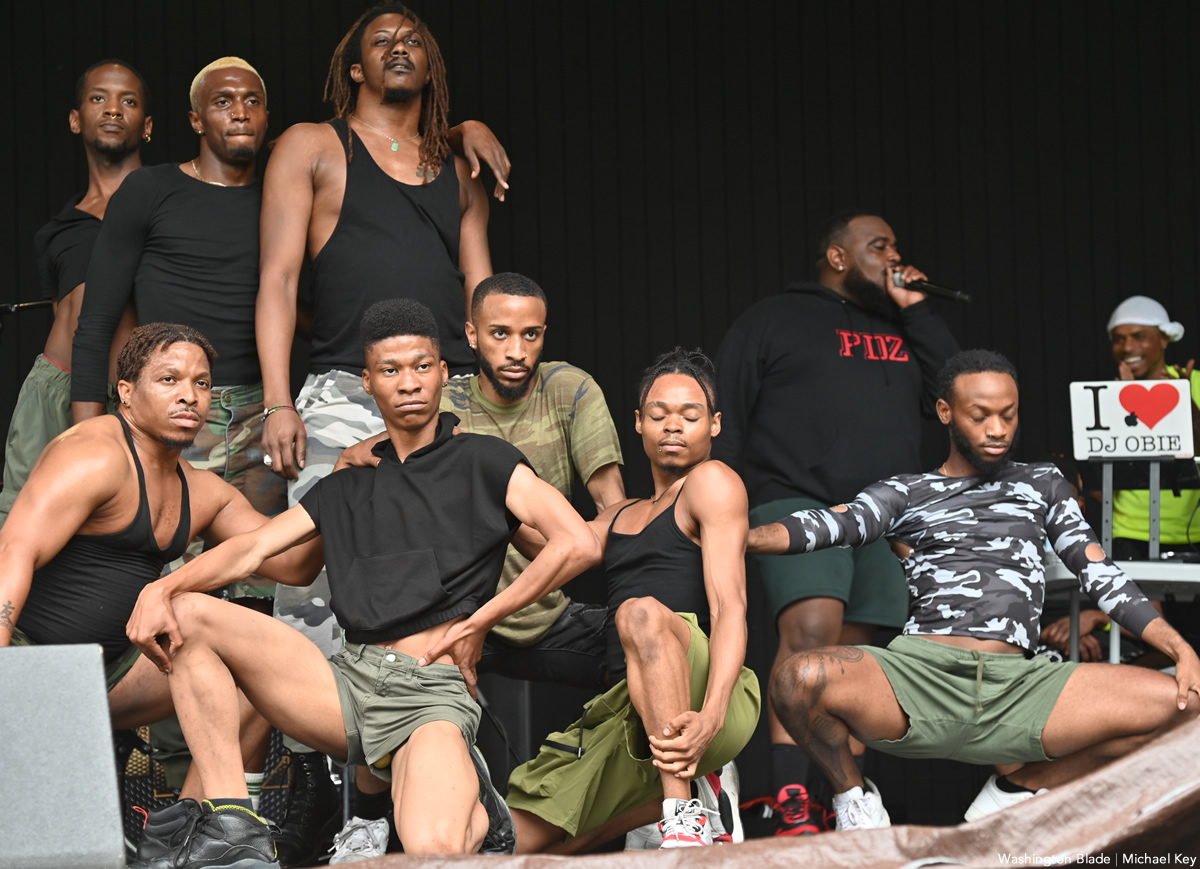
The Center for Black Equity, the organizer of D.C. Black Pride, the nation’s first and one of the largest annual African-American LGBTQ Pride celebrations, announced this year’s event will take place Memorial Day Weekend from May 24-27.
The announcement, released April 16, says that most 2024 D.C. Black Pride events will take place at the Westin Washington, D.C. Downtown Hotel at 999 9th St, N.W.
“With the theme Black Pride Forever, the event promises a weekend filled with vibrant celebrations, empowering workshops, and a deep exploration of Black LGBTQIA+ history and culture,” the announcement says.
It says events will include as in past years a “Rainbow Row” vendor expo at the hotel featuring “organizations and vendors created for and by the LGBTQIA+ community” offering products and services “that celebrate Black excellence.”
According to the announcement, other events include a Health and Wellness Festival that will offer workshops, demonstrations, and activities focused on “holistic well-being;” a Mary Bowman Poetry Slam “showcasing the power and beauty of spoken word by Black LGBTQIA+ artists;” the Black Pride Through the Decades Party, that will celebrate the “rich history of the Black LGBTQIA+ movement;” and an Empowerment Through Knowledge series of workshops that “delve into various topics relevant to the Black LGBTQIA+ community.”
Also, as in past years, this year’s D.C. Black Pride will feature its “Opening Night Extravaganza” reception and party that will include entertainment and live performances.
The announcement notes that D.C.’s annual Black Pride celebration, started in 1991 as a one-day outdoor event at Howard University’s Banneker Field, has inspired annual Black LGBTQ Pride events across the United States and in Canada, United Kingdom, Brazil, Africa, and the Caribbean. More than 300,000 people attend Black LGBTQ Pride events each year worldwide, the announcement says.
Full details, including the official schedule of events, can be accessed at dcblackpride.org.
District of Columbia
Trans woman files bias complaint against D.C. homeless shelter
Says staff forced her to stay in male sleeping section
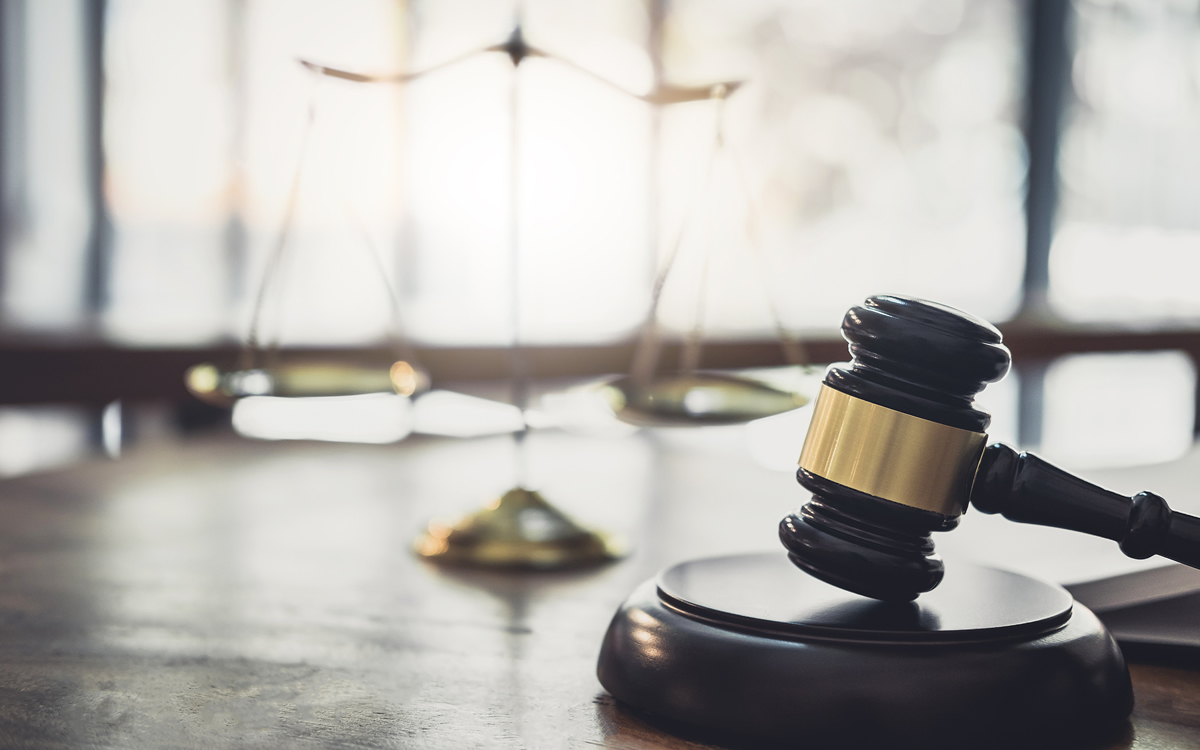
A transgender woman has filed a discrimination complaint with the D.C. Office of Human Rights charging that officials with the Community for Creative Non-Violence homeless shelter refused to allow her to stay in the women’s section of the shelter, forcing her to stay in the men’s sleeping section.
The shelter, located at 425 2nd St., N.W., is one of the city’s largest privately operated homeless services facilities organized by the Community for Creative Non-Violence, which is known as CCNV. It was founded by nationally acclaimed homeless services advocate Mitch Snyder, who passed away in 1990.
The complaint, filed last week by Stephon “Lashawn” Jordan, states that Jordan and a cisgender female friend arrived at the CCNV shelter around 2:30 a.m. on March 22 after they obtained a ride to the shelter through the city’s Emergency Shelter Hotline.
“Upon arrival we were informed that we would have to complete an intake once upstairs at the female housing unit,” Jordan states in the complaint. “Once we arrived a staff member came out. The staff member stated to me that we don’t house transgender individuals in this unit and that I would have to go down to the male shelter unit,” the complaint says.
It says Jordan’s female friend told the staff member she was not going to leave her friend, who identifies as female, by herself in another location at the shelter. “The staff member did not want to hear it and said that both of you can go downstairs too,” the complaint says. “Once we got downstairs to the male shelter unit we asked to speak with a supervisor,” it says.
“Someone came, but the decision was that myself and my friend could go and sleep in the male housing unit,” the complaint states. “During our stay it was very humiliating especially using the restroom,” it concludes.
A spokesperson for the CCNV shelter did not immediately respond to a phone and email message left by the Washington Blade asking for a response to the complaint.
Transgender rights advocates, including D.C. trans activist Earline Budd, who assisted Jordan in filing the complaint, have said the denial of placement of a transgender woman in the female section of a place of public accommodation such as a homeless shelter is a violation of the D.C. Human Rights Act’s ban on gender identity discrimination.
The Office of Human Rights website explains that under its policy for responding to discrimination complaints, the complainant and the accused party are required to enter mediation to determine if the complaint can be resolved. If the mediation fails, the OHR website statement says, a full investigation is conducted that can take up to six months to complete. It says upon completion of the investigation, the office makes a determination of whether probable cause exists that discrimination occurred.
If probable cause is found, the case is sent to the D.C. Commission on Human Rights, which holds a public evidentiary hearing with witnesses before making a final decision on whether discrimination occurred.
-

 Africa3 days ago
Africa3 days agoCongolese lawmaker introduces anti-homosexuality bill
-

 World3 days ago
World3 days agoOut in the World: LGBTQ news from Europe and Asia
-

 District of Columbia3 days ago
District of Columbia3 days agoReenactment of first gay rights picket at White House set for April 17
-

 Africa3 days ago
Africa3 days agoUgandan activists appeal ruling that upheld Anti-Homosexuality Act

